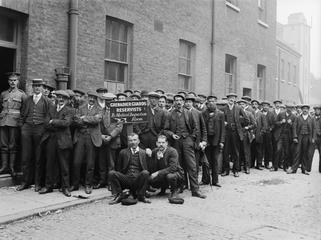A war of flags and drums, and regimental colors? Hardly.
Special to The Great War Project
(8 August) Most political and military leaders from all the great powers believe it will be a short war, over by Christmas.
Many believe cavalry will be the decisive factor, thus the hundreds of thousands of horses initially brought to the battlefields. One historian writes, “All the belligerents were led into action by commanders armed with swords and mounted on chargers.”
More than a few historians note that many soldiers – mostly from France and Belgium – march into battle carrying flags and wearing the bright colors of their regiments accompanied by trumpets and drums.
These soldiers and their artillery pieces are too visible. Writes historian Max Hastings, “Masses of men advanced against devastatingly powerful modern armaments in the same fashion as warriors since ancient times.
“The consequences were unsurprising, save to some generals.” The machine gun and the modern artillery piece do their devastating job all too well.
The consequences? More than a quarter million French soldiers killed and wounded in the first few weeks of the war.
This is also a war for the skies, though few realize it in the first days.
Just yesterday, a century ago, “an unwelcome novelty was introduced,” writes Hastings, “when a Zeppelin airship staged the first-ever bombing raid on a European city.” Nine are killed in the Belgian city of Liege.
This is also a war of spies and secret plots.
Germany enters this war to challenge Russia for preeminence in Europe. And from the first days, Germany employs political as well military weapons to undermine the Russian state.
On this day a century ago, Germany sets a plot in motion that is still reverberating today, a hundred years later. In the town of Neumarkt, forty miles from the Russian border, writes historian Martin Gilbert, the Austrian police arrest “a Russian exile who had been living there for some years, Vladimir Lenin, fearing he might be a Russian spy.”
But German authorities believe that if Lenin is released, “he would be certain to conduct a vigorous campaign against the Tsar and against the allies.”
The first step in this plot? The Austrians release Lenin and provide him safe passage to Switzerland, a neutral nation. The Germans know that in Switzerland Lenin will be free to publish appeals to Russia’s workers to oppose the war.
Later Lenin will return to Russia to lead a revolution that will take Russia out of the war and set the stage for war and conflicts that will last more than a century.


Mike, thanks so much for working to create this site. It’s a fascinating and quite sad read each day. Having included “sad”, don’t think that I won’t keep reading and sharing with folks – there’s far too much valuable information included.
Kudos.